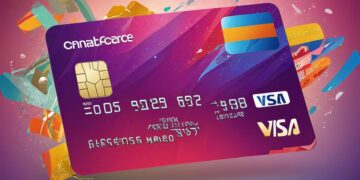Credit Cards for Students: What to Consider Before Applying

Understanding Your Financial Options
Embarking on your college journey is an exciting adventure, but it comes with its own set of financial challenges. One such challenge is managing your expenses, and having a credit card can be a helpful tool. However, it’s essential to use this financial resource wisely to avoid pitfalls. Navigating the world of credit can seem daunting, but with informed decisions, you can turn this tool into a powerful ally.
Key Considerations for Credit Cards
Before you apply for a credit card, consider these crucial factors:
- Fees and Interest Rates: Understand any annual fees or interest charges that may apply. Many student credit cards waive the annual fee, making them cost-effective options. Pay close attention to the interest rates, as high rates can compound your expenses if you carry a balance.
- Rewards Programs: Look for cards that offer student-friendly benefits, such as cash back or discounts on textbooks. For instance, some credit cards provide up to 5% cash back on certain categories like groceries or online shopping, which can help alleviate some financial stress.
- Credit Limit: Assess the credit limit offered to avoid overspending and accumulating debt. A lower credit limit may be beneficial for students, as it encourages responsible spending and helps you stay within budget.
- Building Credit: Using a student credit card to start building a solid credit history is vital for your future. Establishing good credit can affect your ability to rent an apartment, finance a car, or even get a competitive interest rate on loans later in life.
Empowering Financial Decisions
Using a credit card can empower you to make responsible financial decisions. When you treat your credit card like a debit card, only spending what you can afford to pay off each month, you set yourself up for financial success. This discipline not only prevents the accumulation of debt but also enhances your credit score, which can open doors down the line.
Consider leveraging the budgeting apps available for students, which can help you track your spending habits and remind you of payment deadlines. Remember, it’s not just about making purchases—it’s about understanding the value and implications of each financial choice you make.
With the right approach, you can make purchases, build credit, and learn the importance of budgeting. Taking these steps not only prepares you for financial independence but also sets a strong foundation for your future. Embrace the journey of financial literacy, and you’ll find that managing your money can be both empowering and rewarding.
DISCOVER MORE: Click here to learn about the impact of automation on jobs
Making Informed Choices About Credit
As you stand on the threshold of adulthood, understanding how to manage your finances becomes increasingly crucial. A credit card can serve as a stepping stone to financial independence, but without careful consideration, it can also lead to unnecessary stress and debt. Therefore, before you take the leap and apply for a credit card, it’s vital to engage in self-reflection and research to empower you in making informed choices.
One of the most important aspects to consider is your current financial situation. Are you currently working? Do you have a consistent source of income, or will you rely solely on financial support from your family or student loans? Having a reliable income stream not only facilitates timely payments but also instills a sense of responsibility as you begin your financial journey. Understanding your inflow will help you determine how much you can afford to charge on your credit card each month.
- Emergency Fund: Before applying for a credit card, consider establishing a small emergency fund. Being prepared for unexpected expenses, like a medical bill or car repair, can prevent you from turning to your credit card for immediate cash, which may lead to high-interest debt.
- Spending Habits: Reflect on your spending habits. Are you impulsive when it comes to shopping, or do you think carefully before making purchases? Recognizing your personal tendencies will aid in your approach to using a credit card wisely and managing any temptations effectively.
- Understanding Your Needs: Consider what you want from a credit card. Are you seeking rewards for your everyday purchases, or is your primary goal to build your credit history? Knowing your priorities will help you choose the right card tailored to your needs.
Another critical factor to evaluate is the financial education resources available to you. Many colleges and universities offer workshops, seminars, or online courses focused on personal finance and credit management. Taking advantage of these resources can equip you with essential knowledge, enabling you to navigate the complexities of credit with confidence. Remember, education is power, and understanding the implications of credit will place you in control of your financial destiny.
Before applying, consider reaching out to older students or mentors who have experience with credit cards. Their insights can provide perspective on what to expect and create a supportive network. This sharing of knowledge can be invaluable as it prepares you for potential challenges and successes ahead.
In the end, being conscious about your financial choices paves the way for a stronger future. By equipping yourself with insights about your financial situation, understanding your needs and limits, and leveraging available resources, you will be better positioned to select the right credit card and use it responsibly. The path to financial awareness begins now—embrace it with enthusiasm and determination. Your future self will thank you.
DISCOVER: Click here to learn more about fintech’s impact on personal finance
Navigating the Landscape of Credit Card Options
As you explore the world of credit cards, it’s essential to familiarize yourself with the variety of options available. Different cards cater to diverse needs and lifestyles, and understanding these differences allows you to make choices that best align with your financial goals. Take the time to analyze what’s out there and consider your unique circumstances.
One of the first distinctions you’ll encounter is between secured and unsecured credit cards. Secured credit cards require a cash deposit that acts as collateral, making them a safer choice for students with limited credit history. They can be a great avenue for building your credit, as responsible use and timely payments will positively impact your credit score. Unsecured cards, conversely, do not require a deposit but may come with higher interest rates and fees. This can lead to accumulating debt if not managed properly.
- Comparison Shopping: When you’re ready to dive into the applicant pool, take the time to compare the key features of various credit cards. Look out for interest rates (APR), annual fees, and specific terms related to late payments or foreign transactions. Websites that aggregate credit card information can simplify this process, allowing you to weigh the pros and cons of each option side by side.
- Rewards Programs: Many credit cards for students come with added benefits like cash back or points for purchases. If you plan on using your card for everyday spending—such as groceries or dining—look for cards that offer rewards that resonate with your lifestyle. Earning points on purchases can lead to valuable savings or travel benefits down the line.
- Incentives for Responsible Use: Some cards incentivize good financial behavior by offering features like lower interest rates or increased credit limits after a period of responsible usage. These incentives can encourage you to cultivate healthy financial habits, setting the groundwork for your future credit journey.
Also, keep an eye out for student-specific credit cards. These cards are specifically designed for individuals entering the credit scene for the first time, often featuring lower credit limits and fewer fees to ease the transition. They typically strive to educate users about responsible credit usage through various tools and resources, reinforcing the knowledge you’ve gained from research and mentorship.
As you review your options, it’s also crucial to comprehend the terms and conditions thoroughly before signing anything. Fine print can sometimes hold critical information that affects how your card functions. Understanding your card’s terms ensures you are not caught off guard by hidden fees or terms that might hinder your financial wellness. When in doubt, don’t hesitate to reach out to customer service for clarification.
Additionally, consider the long-term impact of your credit choices. Establishing a positive credit history while still in college can facilitate easier approval for loans, apartments, and even jobs in the future. Be mindful that the habits you form now will shape your financial identity for years to come. Embrace the journey into credit management as not just a necessity, but an empowering opportunity to take control of your financial future.
LEARN MORE: Click here to discover how to invest in REITs for steady income
Conclusion
Entering the world of credit cards can be both an exciting and daunting experience for students. As you embark on this journey, keeping a few crucial elements in mind will empower you to make informed decisions that align with your financial aspirations. First and foremost, understanding the differences between secured and unsecured credit cards is essential. By knowing which option best suits your financial situation, you can minimize risks and set a strong foundation for your credit history.
Furthermore, thorough comparison shopping is vital—notice the interest rates, fees, and rewards programs associated with each card. This diligence not only saves you money in the long run but also helps you select a card that complements your spending habits and lifestyle. As a student, taking advantage of incentives for responsible usage can foster healthy financial habits that will serve you well in life beyond college.
Ultimately, remember that building a positive credit history is not merely about seeking financial freedom today but doing so for your future. Each thoughtful choice you make today will have lasting consequences, shaping your ability to secure loans, apartments, and even job opportunities down the line. Take this opportunity to learn, grow, and control your financial future—your journey towards responsible credit management is not just a necessity; it is a powerful step towards achieving your dreams.

Beatriz Johnson is a seasoned financial analyst and writer with a passion for simplifying the complexities of economics and finance. With over a decade of experience in the industry, she specializes in topics like personal finance, investment strategies, and global economic trends. Through her work on World Information, Beatriz empowers readers to make informed financial decisions and stay ahead in the ever-changing economic landscape.





